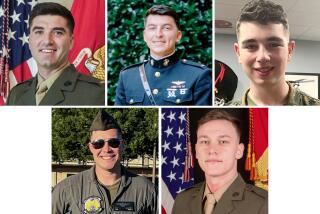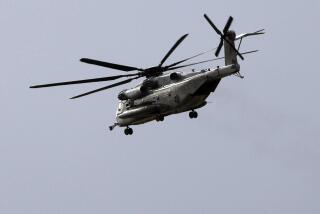Tustin Marine Units Moving to the Front Near Border : Air operations: El Toro pilots are flying bombing and strafing missions daily into Iraq and occupied Kuwait.
- Share via
Marine transport and supply helicopters from Tustin are being moved north toward the Kuwaiti border to be closer to front-line combat troops, while Marine Corps pilots, many from El Toro, are flying hundreds of bombing and strafing missions daily into enemy territory, military spokesmen said Tuesday.
Maj. Jim V. McClain of the El Toro-based 3rd Marine Aircraft Wing said in a telephone interview from Saudi Arabia that Marine Corps fighters and attack jets have been involved since the bombing of Iraq and occupied Kuwait began last week.
The Marine aircraft wing at El Toro has an estimated 10,000 men and women in the Persian Gulf, about 5,000 of them from Orange County.
“The aircraft wing is conducting hundreds of sorties a day and up to this point we have lost only one plane,” said McClain, referring to a downed OV-10 Bronco reconnaissance plane whose pilot, Warrant Officer Guy Hunter, and observer, Lt. Col. Clifford M. Acree, were captured by Iraqi forces.
Col. Manfred Rietsch, commander of Marine Air Group 11 from El Toro, told reporters last week that his F/A-18 Hornets were bombing positions held by Iraq’s elite Republican Guard. Rietsch said the bombing is “bound to have psychological impact. It’s been a constant, controlled bombing without letup.”
McClain said helicopters, including CH-46 Sea Knights and CH-53 Sea and Super Stallions from the Tustin Marine Corps Air Station, are being moved north so they are closer to the “combat element” in case a ground war breaks out. McClain refused to provide any specific information about the new location of Marine Air Group 16.
But a United Press International wire service report from eastern Saudi Arabia said a new helicopter base, which would also accommodate Marine AV-8 Harrier jump jets and C-130 cargo planes, would be within 25 miles of the border between Saudi Arabia and Kuwait.
Lt. Col. Mike Aguilar, second in command of Marine Air Group 16, told reporters that Marine helicopter crews are establishing a forward position “in anticipation of the ground war.” He said his present location in eastern Saudi Arabia is too far away from the border in the event a ground war breaks out and allied troops invade Kuwait.
The new base will also be the home for Cobra and Huey helicopters from Camp Pendleton. McClain said the Sea Knight helicopters will be used primarily for troop and supply movement, while the bigger Super Stallion is designed to lift heavy equipment, such as 155-millimeter howitzer artillery pieces.
McClain said the small AH-1T Cobra attack helicopters, which arrived in Saudi Arabia last August, have experienced limited combat. Just last weekend, for example, a number of the deadly helicopters retaliated after U.S. and allied troop positions were shelled near the Kuwaiti border with Saudi Arabia. It was during those shellings that Petty Officer 3rd Class Clarence Dean Connor, 21, of Banning was injured in the shoulder by a piece of jagged metal. The Navy medic, stationed at Camp Pendleton, was the recipient of the first Purple Heart medal handed out in the war with Iraq.
Speaking over the shrill sounds of air raid sirens in the background, McClain said from Dhahran that Marine fliers and their crews, after waiting for five months, experienced “a certain amount of exhilaration” when the allied forces began bombing positions in Kuwait and Iraq.
“Don’t get me wrong,” said McClain, who was once an OV-10 Bronco pilot and now is the ranking public information officer for the 3rd Marine Aircraft Wing and its commander, Maj. Gen. Royal N. Moore Jr. “Everyone wanted it to end peacefully, but at the same time they were ready for hostilities. The morale among the troops is absolutely great.
“No one is complaining about the long hours. They are ready to mix it up and get back home,” he said, adding that most of the fighter pilots are seeing their first combat.
“They are like athletes. They get butterflies in their stomachs before the game, but once it’s under way they forget about their nerves and get down to business. They are very well educated, very well trained and very good at their jobs,” McClain said.
More to Read
Sign up for Essential California
The most important California stories and recommendations in your inbox every morning.
You may occasionally receive promotional content from the Los Angeles Times.













